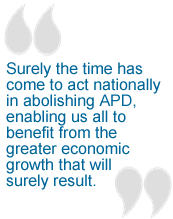| BlueSky Business Aviation News | |||||||||||||||||
|
|||||||||||||||||
From April 1, the APD for business jet operators rose to six times the APD rate for an economy class flight on a scheduled airline. The current four bands - A to D - were reduced to just two: A (0-2,000 miles) and B (over 2,001 miles), with band B seeing significant increases applied and many operators expecting APD increases of over 50%. No one in the business aviation industry objects to paying their fair share, but such a sharp rise is disproportionate. Surveys carried out since 2008 by the Baltic Air Charter Association (BACA) have highlighted the negative impact APD is having on the UK economy. The most recent 2014 survey showed that 55.9% of respondents believe UK operators could sell more flights if APD were removed. Furthermore, the survey also indicates that 25 per cent of non-UK business jet operators do not pay APD when they fly from a UK airport, meaning they are technically operating outside UK law and undercutting British business aviation operators.
Therefore, while politicians may have had supposed ‘fat cats’ in their sights when increasing APD, the reality is that the tax instead hits many ordinary businesses and, in addition, operators will end up shouldering at least part of this extra burden. In a competitive market such as ours, in which price is a key factor, operators’ ability to pass on APD costs to customers is limited. Just because a cost has gone up, whether it’s APD, insurance or fuel, it doesn’t mean we can just increase our charter prices. And what of Scotland’s plans to abolish APD? Whilst good news for passengers travelling from there, the move will come at a cost to the competitiveness of operators in the north of England and will disadvantage travellers elsewhere in the country. Furthermore, many transatlantic business aviation flights use UK airports to refuel. The income from these fuel stops are an important revenue stream for UK airports and Fixed Base Operators (FBOs), but why would an aircraft coming in to refuel choose to stop in England when APD-free Scotland is much cheaper? If the British government expects gross domestic product for the UK to grow by 2.5% in 2015 and 2.3% in 2016, it must support all UK businesses, including the SMEs (such as business aviation operators) that contribute so significantly to the economy. Rather than letting Scotland take the lead on this self-defeating tax, surely the time has come to act nationally in abolishing APD, enabling us all to benefit from the greater economic growth that will surely result.
If you would like to share your views or comment on this topic, please write to: editor@blueskynews.aero
|
|||||||||||||||||


